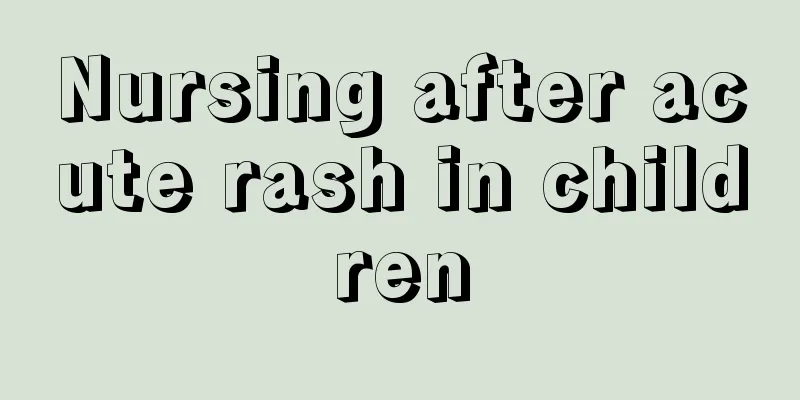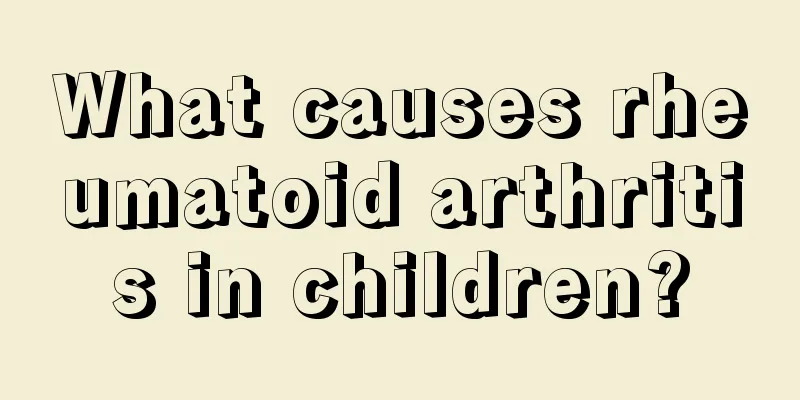Nursing after acute rash in children

|
When a child is diagnosed with a terminal illness, in addition to some basic treatments, some nursing and health care work in life cannot be ignored. Because this disease itself has a relatively large impact on young infants and young children, parents must discover and help in time, and they must adopt the most scientific and effective treatment methods, so that children can grow up healthier. Roseola infantum mostly occurs in infants and young children aged 6 to 18 months. The disease often develops suddenly, with a rapid rise in body temperature, usually between 39°C and 40°C. Severe patients with high fever in the early stages may have convulsions, and some may experience mild runny nose, cough, eyelid swelling, and conjunctivitis. During the fever period, there are symptoms such as poor appetite, nausea, vomiting, mild diarrhea or constipation, as well as congestion in the pharynx and swollen lymph nodes in the neck. After three to five days of fever, the body temperature drops suddenly. After the fever subsides, the child may develop light red macules or maculopapules of varying sizes all over the body, starting from the chest and abdomen and quickly spreading to the whole body. At this time, the child's fever has subsided and he can fall asleep peacefully. This is medically called "fever rash", which is a unique manifestation of roseola infantum. Young children suffering from roseola generally do not need special treatment. As long as they receive intensive care and appropriate symptomatic treatment, they will recover on their own after a few days. After a child is diagnosed with roseola infantum, parents should let the child rest in bed, try to reduce the number of outdoor activities, and pay attention to isolation to avoid cross infection. When a child has a fever, he should be given plenty of water, easily digestible food, and appropriate supplements of vitamin B and vitamin C. If the body temperature is high and the child is crying and irritable, physical cooling or a small amount of antipyretic drugs can be used to avoid convulsions. When a young mother encounters this situation, she should not rush to reduce her child's fever. Instead, she should check her child's vaccination status and cooperate with the doctor's treatment. The above are some care issues for children after vaccination. Parents and friends should pay more attention to the impact of these diseases on children in daily life. Because only with a more scientific and comprehensive understanding of them, when encountering such a situation, can we quickly adopt scientific treatment methods. |
<<: Will children with roseola vomit?
Recommend
What to do if your baby's tear duct is blocked
Blocked tear ducts in infants is a common phenome...
Parents should be alert to the causes of allergies in children!
Children often suffer from allergies, which makes...
Can a child take a bath when he has a fever?
Children are weak, and they need to take preventi...
What causes a newborn baby to have a big head?
A newborn's big head is a very troublesome pr...
How to lose weight when a child has a big belly? These methods are very effective
If a child has a big belly, it is mostly caused b...
My child's arm is swollen after vaccination
Sometimes parents will find that their children&#...
How to deal with burns in young children?
Many friends do not understand how to deal with b...
What are the effective solutions for baby's airsickness?
Airsickness and motion sickness are common in lif...
What to do if a newborn has a red birthmark on his head
Most babies will feel a bluish birthmark on their...
How to care for a baby girl's private parts
Many parents think that caring for the baby's...
Why are children always sleepy?
Many parents always encounter situations where th...
What is the reason for the baby's breathing 60?
Every baby is an angel in the family. From the mo...
Ways to enhance your child's immunity
The weather is cold in winter and the temperature...
The dangers of premature babies born 8 months ago
A baby born at eight months of pregnancy is consi...
What should I do if my child always burps after feeding?
After a child is breastfed, parents will choose t...









